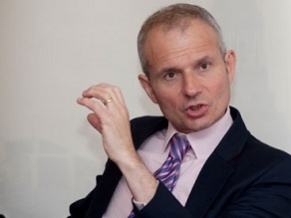|
World Jewish News

British Foreign Office Minister for Europe David Lidington confirmed representatives at Monday’s EU foreign affairs council meeting in Luxembourg “will address the deteriorating prospects of a two-state solution”.
|
British Minister confirms EU foreign ministers will discuss ‘deteriorating’ Mid East peace process at council meeting
19.06.2013, Israel and the World British Foreign Office Minister for Europe David Lidington confirmed representatives at Monday’s EU foreign affairs council meeting in Luxembourg “will address the deteriorating prospects of a two-state solution”. His comment Tuesday follows European leaders’ positive response to US-led attempts to reinvigorate the stalled Middle East peace process, which has seen Secretary of State John Kerry champion the Arab Peace Initiative, which has largely been discarded since its 2002 inception.
Extrapolating on Britain’s intended contribution to international efforts aimed at resuscitating the process, Lidington said he would “focus on how the EU can support and contribute actively, alongside other regional and international partners, to efforts led by the United States to drive progress on the MEPP”. He further invoked possible “incentives” that could be offered to both Palestinians and Israelis for showing willing to reach a negotiated solution, “particularly on the economic and security tracks”.
The EU has placed great emphasis on the Palestinian Authority (PA)’s intensely strained economy, investing in institution building to the tune of , whilst acknowledging Israel’s legitimate security concerns in the wake of last November’s Gaza escalation and the threat of a spillover of hostilities into Israel from the Syrian crisis.
“I will press for Conclusions which outline the EU’s approach and support to the US,2 he vowed.
Monday’s meeting will follow hot on the heels of EU foreign policy chief Catherine Ashton’s tour of the Middle East, which concludes Thursday, and saw her meet with Israeli Premier Benjamin Netanyahu and Justice Minister (charged with promoting direct peace talks with the Palestinians) Tzipi Livni in Jerusalem, PA President Mahmoud Abbas and newly-appointed PM Rami Hamdallah in Ramallah, and UNRWA Commissioner Filippo Grandi in the Gaza Strip.
Acknowledging that this was “a very timely visit to the region” ahead of her departure Sunday, she echoed Lidington’s emphasis on recent US efforts, as she committed to exploring “the possibility to further support these efforts and for the Israelis and Palestinians to re-engage in efforts towards a negotiated solution”.
However, Ashton was not expected to receive a red carpet welcome from Israeli authorities on her arrival in Jerusalem Thursday, with an unnamed Israeli official telling Israeli daily The Jerusalem Post Sunday that she would face an unyielding rhetoric on the contentious settlement issue. Netanyahu’s government is expected to insist that if the EU continues to function on “auto pilot” criticising Israeli settlement expansion as an obstacle to direct peace talks with the Palestinians, the Palestinians would conclude they have a “free pass” to act without fear of European reprisal.
The EU has consistently taken a hardline against Israeli settlement policy in the West Bank and East Jerusalem, issuing two staunch condemnations of the activity last May and December, in what is widely seen as a prelude to seemingly inevitable action on the labelling of settlement produce. At a Brussels press briefing earlier this month, Israel’s envoy to the EU David Walzer delivered a ringing indictment of Europe’s preoccupation with Israeli settlement policy, as he insisted the EU “could be much more influential, much more important in the peace process if they chose to look at other issues as well and not focus their attention” on settlements.
by: Shari Ryness
EJP
|
|
